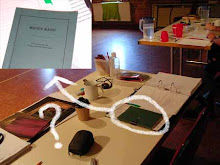
The first thing of the morning is to ‘run.’ Chris wants to run through everything we’ve looked at so far from the beginning of the play. The thing that strikes me immediately is how much work has been done in the overnight period. There’s a really obvious filtering or sifting that’s occurred away from the rehearsal room. Seeds from the earlier days’ work are now already flourishing. Or, to extend the metaphor, are lying dormant to grow later, and some will inevitably fail to fertilize beyond this point.
While Chris continues to work his way through the play, Lally, Stephen and Maryanne go to another room to work on the second act. There’s agreement after the reading that the second act isn’t quite ready yet. There is some script work that is best done ‘on the floor.’ An director with actors can quickly burn off text that isn’t working, or add text that the scene needs. There is another kind of script work that can really only be done by writers and dramaturges. ‘Big picture’ script work and generally any script issues that can’t be solved by interrogating a moment are better done by the writer or writing team. It is the latter kind of script work that the trio leave to do. Chris and the actors will be working on the first act into next week, giving the writing team a small window in which to keep developing the script.
Watching Chris as he develops the scenes with the actors, it occurs to me that there are (at least) two kinds of theatrical ‘moments’ that demand different treatment. Some moments can be, or need to be, solved gradually. The moment doesn’t need to be solved in the immediate rehearsal. It can be worked to a satisfactory point, then left for a later time. There are other moments that need to be solved in the immediate timeframe. To move onto something else before solving the moment only means that you will have to begin it all over again next time. The rhythm of rehearsals are in some ways governed by the demands of these different types of moments.
In the afternoon the heat starts to build. Everybody works with a lot of focus. There’s a fair bit of chaos in the first act of the show, and working on chaos takes enormous focus to get right. Nevertheless, there are inevitably a couple of moments when wires get crossed between stops and starts, or actors don’t get to the right place in time. Just for those brief moments, the inner life of the play reveals itself and shows us what the energy might feel like once the work gets closer to performance. It’s exhilarating. And the actors are feeling like a cast more and more.
Around this time I ducked out of the rehearsal room to catch up with Lally and Stephen to find out what they were working on in relation to the second act. They talked about 3 different areas of work they had in mind; restructuring, editing and “fine tooth combing.”
By restructuring they talked about working on the ‘flow.’ They wanted the flow to specifically contrast with that of Act One, and were working hard with the structure of scenes to achieve that contrast.
By editing they referred to a list of different tasks that were being undertaken. They were looking at previous drafts for elements they thought were valuable that may have been lost for one reason or another. They talked about “re-fleshing” the characters. Sometimes character detail in the script can be lost in drafts that are focussed on the narrative and broader arcs. By “re-fleshing” they were looking to bring some of this character detail and ‘colour’ back. They also discussed re-committing to the mystery within the piece. Again, as a play is re-drafted and script issues are ‘solved’ the innate mystery of the script can be lost in favour of connecting things and trying to ‘make sense’ of everything existing in the script. Often questions can be far more interesting than answers. Finally they talked about cutting back the obvious plot mechanics. This is related to some of the above points. There is a sense that once the world is built, some of the ‘scaffolding’ that was required in the building needs to be removed for the piece to be allowed to house its own integrity.
And the third thing is “fine tooth combing.” This is much what is sounds like; running through the script word by word, phrase by phrase, line by line, and cleaning it up.
Lally’s one word for the day - structuring
Chris’s one word for the day - fun
Darren’s one word for the day – magic
Stephen’s one word for the day – eerie
Kristen’s one word for the day – mental chaos




No comments:
Post a Comment